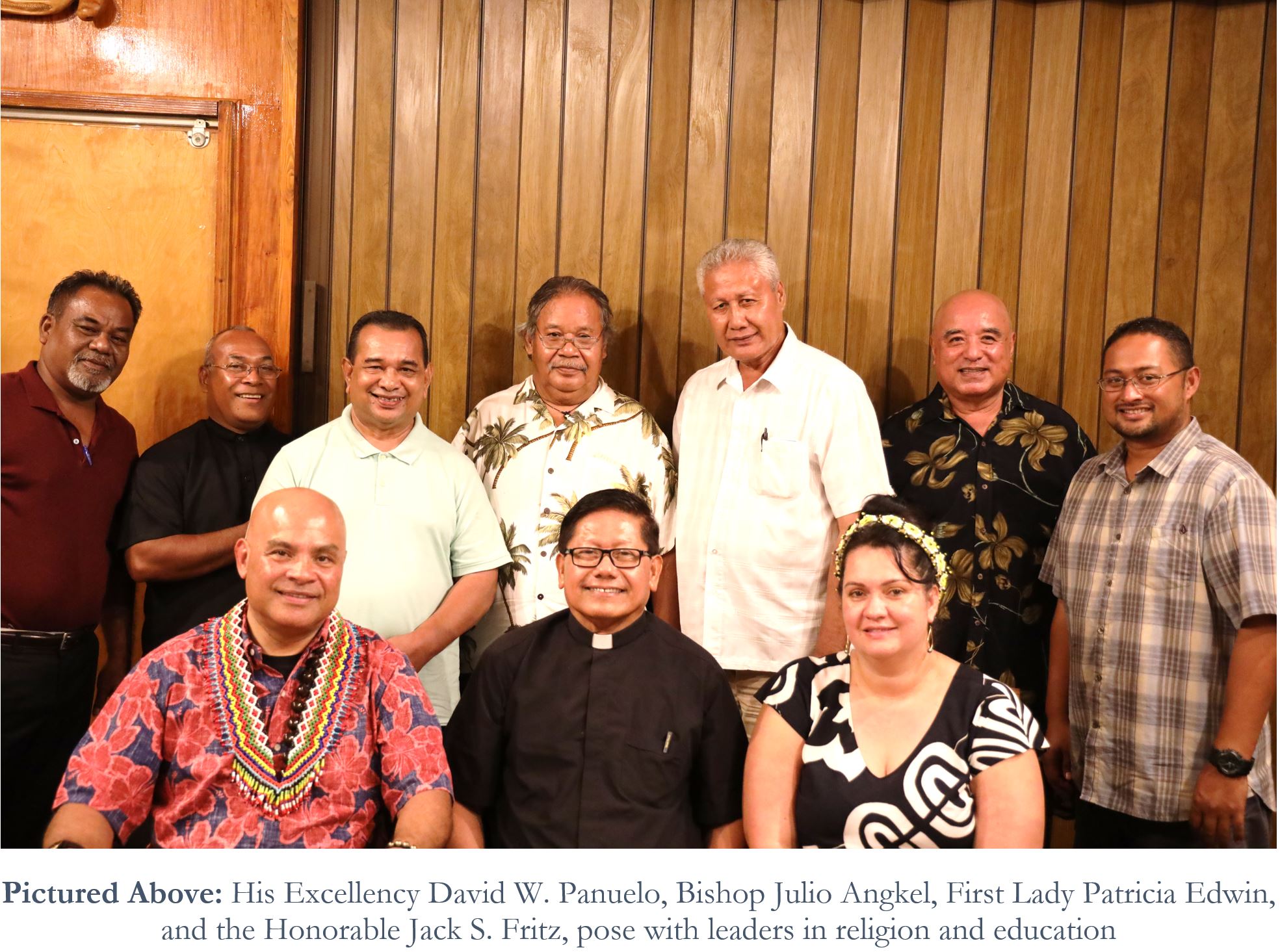
FSM Information Services
Press Release
President Panuelo Discusses Potential Government Assistance to Caroline College & Pastoral Institute with Bishop Julio Angkel & Other Religious Leaders
WENO, Chuuk—On November 26th 2019 His Excellency David W. Panuelo, President of the Federated States of Micronesia (FSM), met with Father Julio Angkel, Bishop of the Roman Catholic Church, and numerous other Chuuk-based religious leaders to further advance and promote the Nation’s commitment to freedom of religion and friendship with all peoples and organizations. While the meeting covered many topics, perhaps the most notable were the President’s commitment in various areas to support the Caroline College & Pastoral Institute (CCPI), and broader discussion on strengthening the Nation’s unity.
CCPI was founded in 2010 and, since 2014, has partnered with Chaminade University of Honolulu to provide a bachelor’s degree program for the purpose of strengthening the teachers presently employed, or seeking employment, at the Chuuk Department of Education. Students take 40% of their classes with CCPI directly, and 60% of their classes remotely with Chaminade University of Honolulu; through this partnership, it was advised, the 64 contemporary graduates of the Bachelors’ program receive degrees through Chaminade University of Honolulu. This is thematically similar to historical partnerships between the College of Micronesia-FSM and the University of Guam.
“So, you receive revenue from PELL Grants, Chuuk State Scholarship and the FSM Scholarship…do you receive any revenue from the FSM National Government directly, through the form of subsidies or aid to non-public schools?” President Panuelo asked.
“We do get appropriations from the [FSM] Congress, but it has been lapsing,” said John Martin, Director of CCPI, who explained that there have been issues navigating the various State and National Government bureaucracies and that one of the primary challenges has been the lack of continuous and dedicated funding to support the school.
While the FSM National Government acknowledges that bureaucratic pitfalls and stopgaps are a reality in any Government, including in the FSM, it is the intent of the Government to limit these where they are unnecessary or where they weaken development of the Nation’s economy.
“We can always look at it and see if we can get some dedicated funding [à lathe College of Micronesia-FSM],” President Panuelo said. “I will be reviewing this in more detail and consulting with [the Honorable Kalwin Kephas, Secretary of the Department of Education] and, of course, Members of Congress.”
For the sake of comparison, the FSM Fisheries & Maritime Institute (FSM-FMI)—which receives funding from the FSM National Government via the Congress—has under fifty (50) students; CCPI, by contrast, was advised to have enrollment of more than 200 students at present.
On the premise that the courses taken at Chaminade University of Honolulu via CCPI are online and thus require relatively significant amounts of bandwidth, the President also advised the attendees that he would communicate with FSM Telecommunications Corporation (FSMTC) to request if CCPI can receive the same internet package afforded to the College of Micronesia-FSM’s campus in Chuuk (presuming that it isn’t already).
“I will also ask on your behalf,” the President said, “if the Ambassadors of Japan and China can do anything to support [the construction of a multi-purpose building]. Japan and China have been building gymnasiums…I can give them a good [project to promote FSM-Japan and/or FSM-China relations through the development of our tertiary education sector.]”
While the remainder of the meeting included discussion on numerous other topics—such as the election of the 4th Constitutional Convention’s delegates, the Integrated Coconut Processing Facility on Tonoas, the DaYang fish factory in Kosrae, the importance of education, the state visit to Japan, the upcoming state visit to the People’s Republic of China, and the recent visit of the U.S. Interagency team’s preliminary discussions with the Joint Committee on Compact Review & Planning (JCRP)—a key theme that popped up several times was the continuing need to emphasize national unity through words and actions, and to constantly build upon the idea that all citizens of the FSM are Micronesians and, as Micronesians, brothers and sisters in solidarity with one another.
President Panuelo noted how he draws daily inspiration from gifts given to him from Bishop Angkel a few days after he was sworn into office.
“I was really honored that you mentioned our gifts [today and before],” Bishop Angkel said, referring to his meeting on May 14th, 2019, when he bestowed to President Panuelo three gifts. The first gift—a paddle—represented a Micronesian canoe’s capacity to propel and guide its movement, like how the President must propel the Nation forward; the second gift—rope—represented tying the parts of a canoe together to form one vehicle, like how the President is expected to unite the Nation and create ties and bonds with the broader world community; and the third gift—a mat—represented a Micronesian navigator’s star compass, wherein the navigator lays stones representing the various stars that will guide the canoe, like how the President must guide the Nation to success.
Each of these gifts, Bishop Angkel explained back in May, are necessary for the canoe and its navigator—the FSM and its President—to function; and each of the individual items would represent the governmental pillar, the religious pillar, and the traditional pillar of the Nation. The gifts are also representative of the Trinity—the Father, the Son, and the Holy Spirit.
“I said I would use [the paddle, rope, and mat] as symbols of unity,” President Panuelo said at the November 26th meeting, noting that he hopes that—whatever else results from the 4th Constitutional Convention, set to take place on January 7th, 2020—citizens across the FSM will feel empowered to participate in the democratic process, and take action on issues that are important to them. “It’s an essential opportunity for the Nation to tighten its unity. We are all one family.”